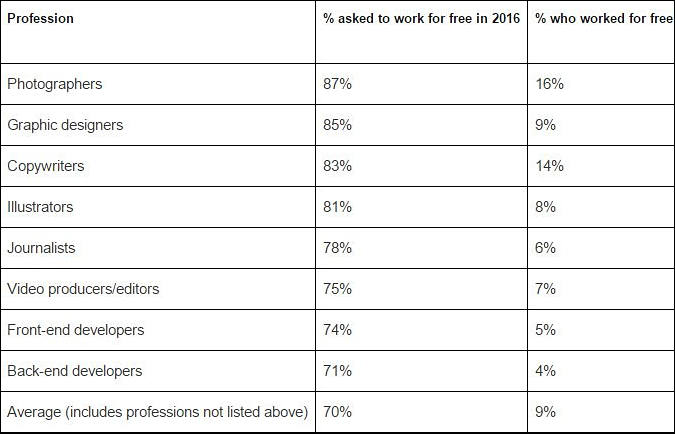
-

The research was conducted by the UK startup Approve.io, they asked 1,009 part-time and full-time freelancers in the UK.

 sample381.jpg675 x 434 - 41K
sample381.jpg675 x 434 - 41K -
That's interesting! Purely speculation, but I'm wondering if you're more likely to work for free (or get asked to) if there is going to be less ongoing hassle afterwards – hence taking photographs / playing music for free is going to be less onwardly demanding of anyone's engagement than say, being a backend developer, which might involve you tweaking stuff for an amount of time afterwards.
It also means the person who provides a service has a bit of power thanks to being locked into a relationship where onward work/costs might be involved. So perhaps people are more likely to ask somebody to work for free if they think of it as a single event which doesn't involve them being held to ransom in some way, down the line.
Of course, from the point of view of the person providing the service, their work lives on. So anybody providing a service is going to think more than once about doing something for nothing, when the results are still going to be around, and long after people have forgotten that you did it as a favour. Probably like everybody else, for that reason if I do something for nothing, I still have to do it to a high standard. I can't just do a sloppy job because I'm not being paid. It's a true test of whether you feel passionate enough to want to do the work!
-
In my experience working for free sets a precedence, devalues you professionally and very rarely (if ever) leads to realistically paid work.
Howdy, Stranger!
It looks like you're new here. If you want to get involved, click one of these buttons!
Categories
- Topics List23,964
- Blog5,723
- General and News1,342
- Hacks and Patches1,151
- ↳ Top Settings33
- ↳ Beginners254
- ↳ Archives402
- ↳ Hacks News and Development56
- Cameras2,361
- ↳ Panasonic990
- ↳ Canon118
- ↳ Sony154
- ↳ Nikon96
- ↳ Pentax and Samsung70
- ↳ Olympus and Fujifilm99
- ↳ Compacts and Camcorders299
- ↳ Smartphones for video97
- ↳ Pro Video Cameras191
- ↳ BlackMagic and other raw cameras121
- Skill1,961
- ↳ Business and distribution66
- ↳ Preparation, scripts and legal38
- ↳ Art149
- ↳ Import, Convert, Exporting291
- ↳ Editors191
- ↳ Effects and stunts115
- ↳ Color grading197
- ↳ Sound and Music280
- ↳ Lighting96
- ↳ Software and storage tips267
- Gear5,414
- ↳ Filters, Adapters, Matte boxes344
- ↳ Lenses1,579
- ↳ Follow focus and gears93
- ↳ Sound498
- ↳ Lighting gear314
- ↳ Camera movement230
- ↳ Gimbals and copters302
- ↳ Rigs and related stuff272
- ↳ Power solutions83
- ↳ Monitors and viewfinders339
- ↳ Tripods and fluid heads139
- ↳ Storage286
- ↳ Computers and studio gear560
- ↳ VR and 3D248
- Showcase1,859
- Marketplace2,834
- Offtopic1,319







